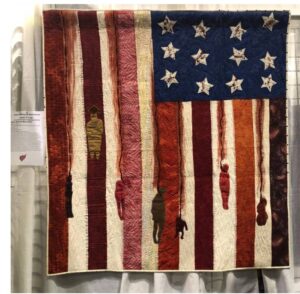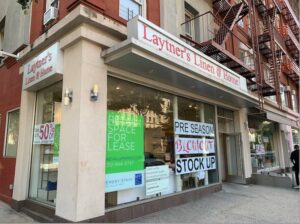It’s five o’clock somewhere. Or so I assure myself as I peer into the darkened storefront on West 24th Street.
In truth, it’s just after 3:00PM on Tuesday afternoon and I am heading into a non-descript bar, alone, just off Sixth Avenue. It doesn’t look like much from the outside. Flat, slate gray façade. Two standard-sized tinted windows. Little signage except for the lower case “one star” that appears above the door. It looks, well, actually a bit creepy.
I yank at the handle but get nowhere. The bar has yet to open. Because really, who would be drinking at 3PM on a Tuesday? Apparently me.
I have come to this watering hole in the middle of a rapidly tourist-ifying Chelsea neighborhood, where hotels are quickly displacing storefronts, to have a beer with Joe DiPietro, 56 year old full-time bar owner, part-time cruciverbalist, and one-time collaborator with MSNBC’s Rachel Maddow. More on that later.
But really, to be honest, I am here because I love crossword puzzles. And when he’s not tending bar or hanging out with his family of five, Joe creates them, lots of them over the years, all for the estimable New York Times. He is one the paper’s top producers, currently clocking in at over 130 well-crafted and often unsolvable grids. A bona fide cruciverbalist.
I call the number that Joe had given me days before.
“Yup.” Joe’s greeting suggests something less than a willing or good conversationalist. Hopefully beers will fix that. “Door should be open. Pull harder. And give me a few.”
Like its owner, one star bar’s interior does not make much of a first impression. It’s a dive bar, plain and simple. A long, dimly lit room anchored on the left by a well-worn, dark wood counter of almost equal length, similar in distance to an Olympic swimming pool. The bar’s surface is a bit sticky, the residual effect of lots of poured drinks over many long nights. Behind the bar is a limited selection of non-premium booze. Two chalk boards frame the bottles, listing a few varieties of beer, either “Canned” and “Tapped”. Another board lists the even more limited menu: 2 pop tarts for $3; Cheez It’s for one. No overeating here.
Joe emerges from the dark recess at the back of the room with an easy lope, an extended hand and what could be the early stages of a grin. “Joe. So what do you want?”
Joe looks like the guy who decided in college that he wanted to own a bar but no one believed he could pull it off. Physically, he’s clearly older. Some white hairs at the temples. A few lines on his face. Teeth tinged gray, probably from cigarettes over the years, some moving this way, others, that. But his clothing and, initially, his demeanor, still say 20-something Dead Head.
With his faded blue/gray flannel shirt, his well-worn, non-label jeans, and beaten up sneakers, he could easily pass for a beer buzzed regular in his own establishment. Understated and chill. That is, until he starts talking.
Joe likes to be in control.
Joe’s first job after graduating from college was as an ad copywriter for magazines. The logophile in him liked the creative side of the business, playing with words. He still considers himself a sloganeer. As for Madison Avenue? He’s openly dismissive of what passes for imagination there. “If I see a slogan on TV I think, no, no, no. Why are you doing that?” he shrieks.
He also didn’t take kindly to the non-creatives telling the creatives what to do. “Someone’s always looking over your shoulder. It’s really frustrating.” After a string of bad days, he quit. Snapped, in a way. Bolted. Blame it on a tightly wound personality or the heightened sensitivity that seems to come with artistry or a predisposition to doing it his way, Joe couldn’t take it anymore.
Plan B? With almost no money behind him, he teamed up with a buddy from college – “two idiots, winging it,” he chuckles – and decided to open a bar in lower Manhattan, in a neighborhood filled in the evenings with young Wall Street professionals coming home from work. Neither partner had any formal business training but they made up for it with a heavy dose of “what do we have to lose?” as well as an appreciation for the off-beat and a desire to get out from under the Big Man’s thumb. Joe knew enough that when it came to bars and restaurants, no one ever made money from food. So there was none. No happy hours either. “We didn’t need it” Joe explains. “The drinks were already dirt cheap.” He also knew enough about marketing to know that a distinctive brand can sell. So he named the bar what he and his friend found themselves saying again and again to those who asked “what the hell are you doing?” “No Idea”.
Joe likes to be right.
Joe is no perfectionist. Otherwise, he would have fired his dentist years ago. But he admits he needs to be right which is why after 20 years of partnership, he bought out his buddy and went solo. He doesn’t want suggestions from his bartender about new drinks or brands. He barely manages a nod when customers tell him what he might do to up his sales. He is the decider. Period. “I’m a benevolent dictator,” he confesses, stressing the “benevolent”. “This is what I need. My destiny is up to me.” The benefit for his staff, he claims, is that one star is a really easy place to work: just do the job, enjoy the scene, and get on to the rest of your life. Joe’s in charge.
When prompted as to whether these characteristics – the desire to control, the need to be right – is what drew him to puzzles, Joe hesitates and looks to the side. He shifts on his stool. The
question has clearly makes him uncomfortable, not for the query, per se, but for the fact that it seems to touch something deeper. He brushes it aside. “I started as a math major and ended up with English because I wanted to be a sportswriter,” is his short explanation. He liked manipulating words; it was like building equations. It was neat. It made sense.
Joe goes on to say that his dad did the hometown puzzle. He started doing them regularly in college, a way to fill long stretches of boredom, while hanging with friends. He can’t remember when he started doing the New York Times version but he claims he does remember his first paid submission: 1994 for fifty bucks. Actually, it was August of 1995, a Saturday, the most challenging day of the week for puzzle solvers. Since then, almost all of his works of art have been for the sometimes unsolvable Friday, Saturday, or Sunday editions.
Will Shortz, the longtime puzzle editor of the Times, and the only boss Joe has known in recent years, once remarked: “Solving crosswords eliminates worries. They make you a calmer and more focused person.” They are clearly a happy sedative of sorts for Joe and his creative tensions, a soothing remedy to his need for order and one solution. Puzzles give him a way to channel some eccentricities too – like using only felt tip pens, and not allowing himself to touch the edge of the gridlines – safe within the confines of 15 x 15 box symmetrically aligned square.
Joe does his best to keep it light.
Joe admits he creates most of his puzzles now on the computer which helps but only slightly. It can take him upwards of 200 hours to construct a Sunday puzzle, all for a $2250 payday. One of his favorite Sunday editions was when he was asked to collaborate with a well-known figure for the Times’ annual celebrity grid. “God, I didn’t want to do it,” he moaned with the exasperation of a pro being forced to babysit a wanna be. “First they suggested Howard K. Smith and I was
like, nooooo. Then they came back with Rachel Maddow and I thought, hey, why not?”
Joe sent Maddow construction software for puzzles not knowing what to expect. “What could she possibly bring to the party?” More than 100 emails and at least one meeting at the back table of bar later, they collectively nailed it. “She was into it. She’d make suggestions and I’d say ‘you can’t do it this way’ and she’d ask why and then work it and come back with something else.” Maddow wanted to use obscure fishing terminology – Joe says she loves to fish – but he rejected most of it. Nonetheless, he says she was “really amazing” and credits her with his favorite clue of the puzzle: “Big mean on campus”. Answer: GPA, he chortles. The sign of wits well matched.
Joe prefers other constructors who keep it light, too. The one he admires most is Merle Reagle because “he was so damn funny.” One of Reagle’s better known grids called “Hit Song”, was what the author called “Sean Penn’s version of “My Way”. It included the theme entries I’M IN A / RUSH, NO PICTURES, PLEASE, OR / ELSE YOU’LL LEARN THE / BLACKENED EYE WAY / THE RECORD SHOWS / I’LL BUST YOUR / NOSE IF YOU GET IN… / MY WAY.
At home in Brooklyn with his wife and three kids, humor reigns as well. “The whole house is about the joke. I feel like that is part of my job” he says. “I grew up in a tense household”, he explains so he goes out of his way to make sure his kids grow up with something different. He is more relaxed there, as well, admitting that the homefront is his wife’s domain. His need for order and control go away. “I tell my wife, never asking my opinion anything, even a paint color. Why are you asking? I actually do think my wife is colorblind but…” If there is a difference of opinion, it is her call alone.
Back at the bar, things are no less amusing. From the unusual menu items to his Facebook postings like “We turn two years old today. Excuse the tantrums” and “We aren’t potty trained by we do turn 3 today”, levity abounds. When he decided to move the starting time for the weekly trivia time up one hour, Joe quipped on line: “Does that get you home early enough, ya babies?”
Even the name “one star” is a well-placed poke at the status quo. (omit?) Joe says it’s a dig at Yelp and its rating system which he thinks is, well, “bullshit.” “When we owned No Idea there was one guy who gave us one star because we charged him for seltzer. I mean, come on. One
star means there is shit in the toilet. Or the tap has gone flat. But one star?” he asks incredulously. He adds that ironically, the whole schtick is backfiring now with pretty much straight up great reviews since he opened almost a decade ago.
—
Opening time is approaching. That night’s lead bar keep – a part-time, one star veteran named Gigi with a dismissive smirk, a hearty laugh, and an imposing presence – begins to set up. It’s Joe’s opportunity to start moving on, too. He says he needs to head down the bar to bury that night’s inventory of beer cans in ice. A brief detour, likely, as soon after Joe will duck into his other fiefdom, in the back office of one star, to dream up another five star New York Times puzzler for the slightly obsessed, like me.
Feedback
Too long, needs tightening – don’t use cruciverbalist twice – don’t need section titles – remove Reagle – No overeating here. (reduce commentary in some sections) Show don’t tell. Don’t need to say so many times that he’s in charge, he’s in control, etc. Remove humor at home since there are no examples
Wanted more of a description of regulars – more about crossword community – maybe instead of Reagle – or more examples from his puzzles that are clever or funny. Claims vocab has nothing to do with it. “notoriously unsolvable” clarify that it’s the Times puzzle is estimable – add revenue of xword puzzle subscriptions
Narratively there is a need to get the reader from No Idea to One Star – earlier – no longer there replaced with high end chicken joint –
Add the he gave up on xwords for sodoku
What makes a joe puzzle different?
Construction process – reject the obscure – it’s about clever not vocab – Add that we never drank
Get a real sense of what he’s like to be with



